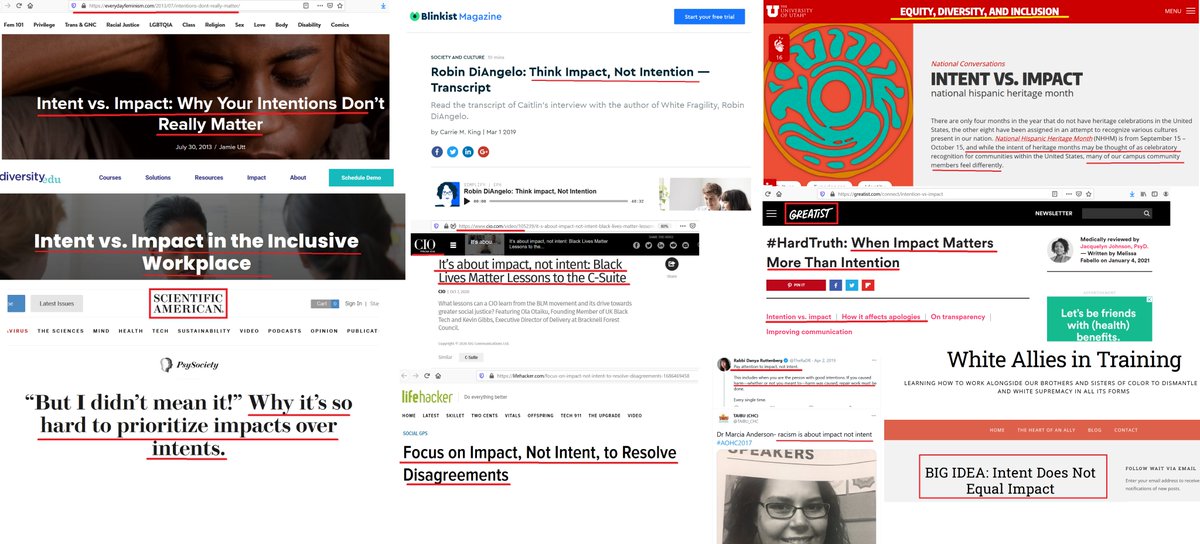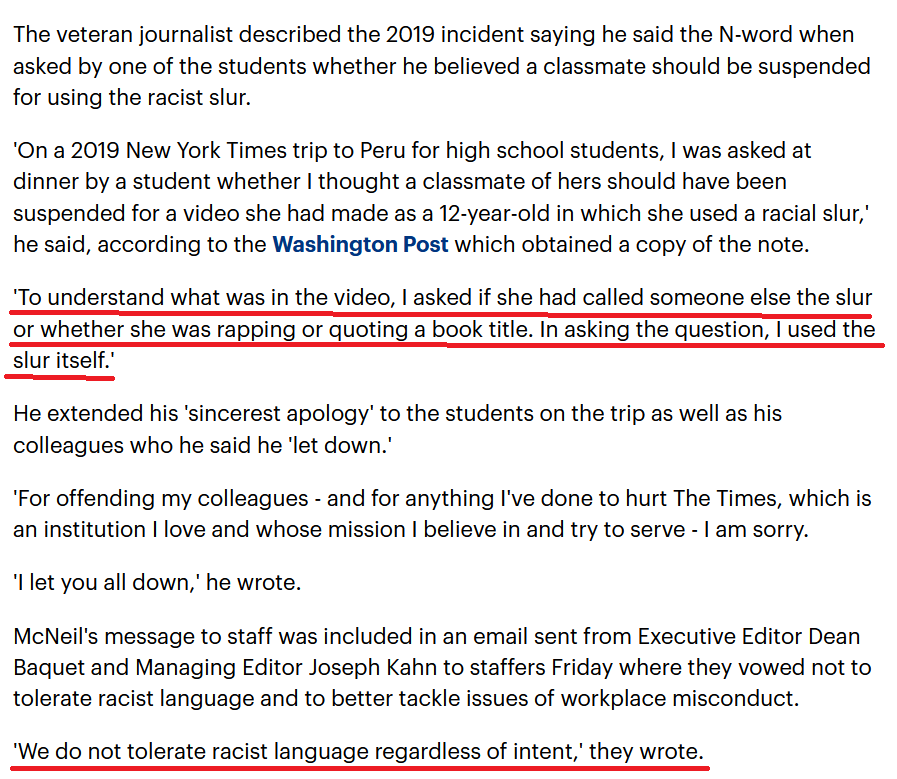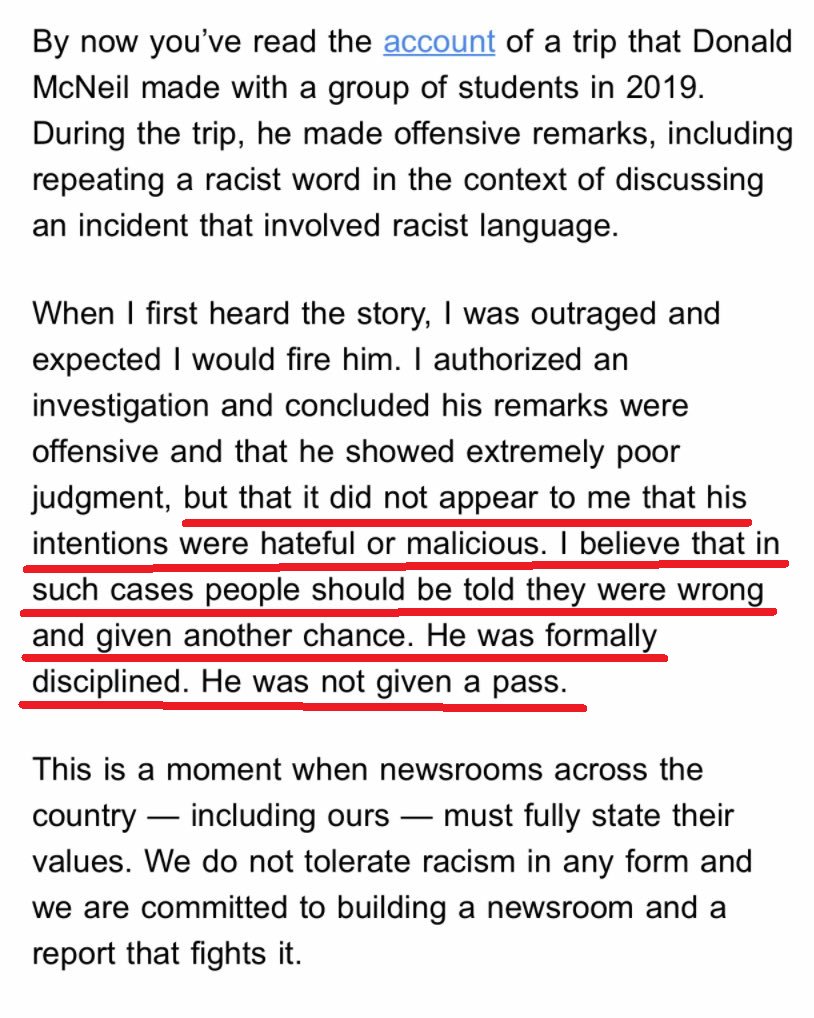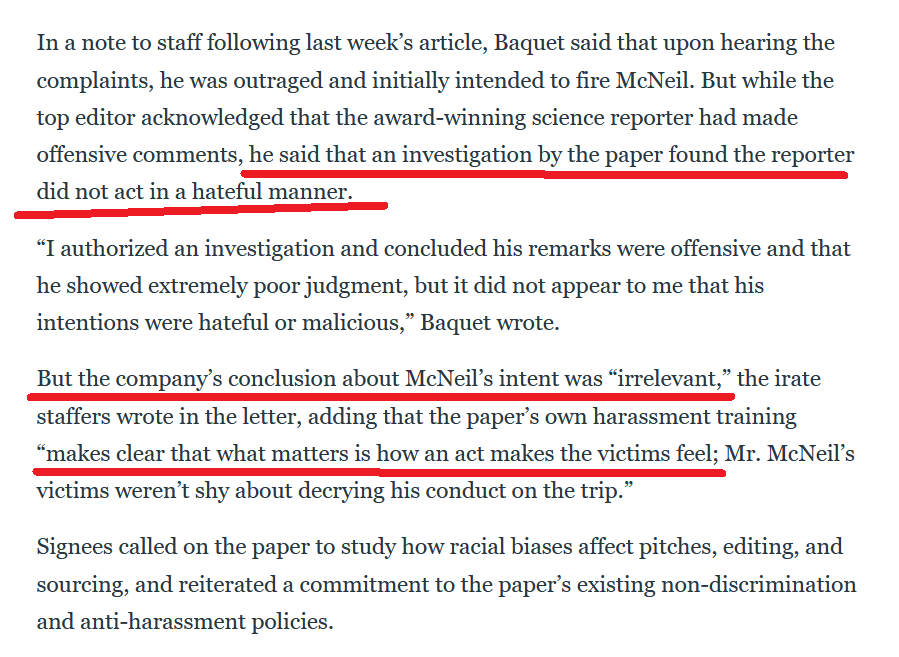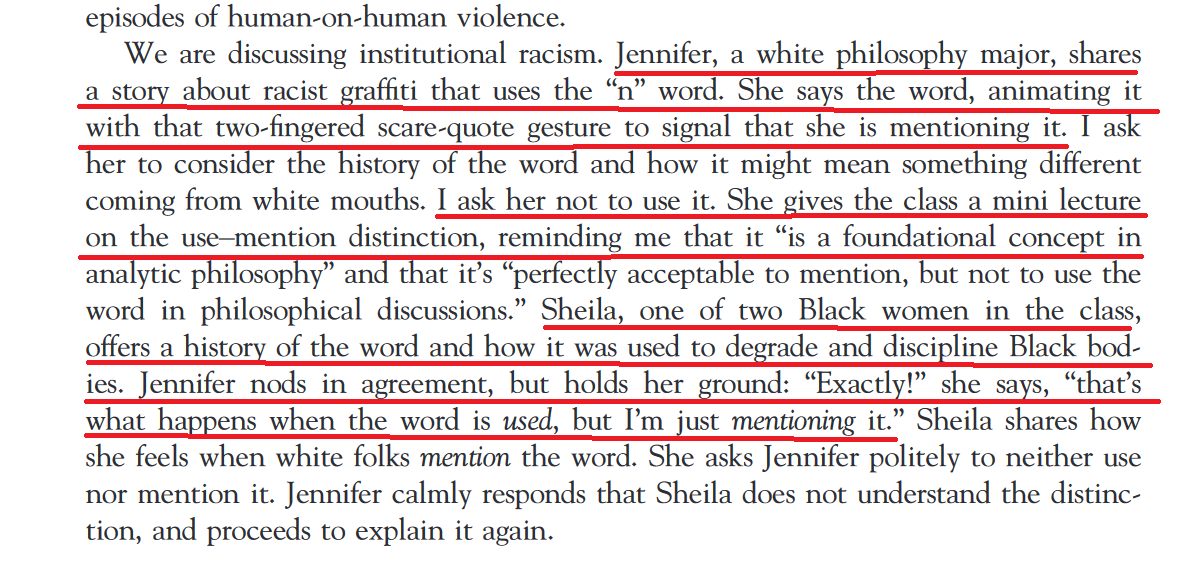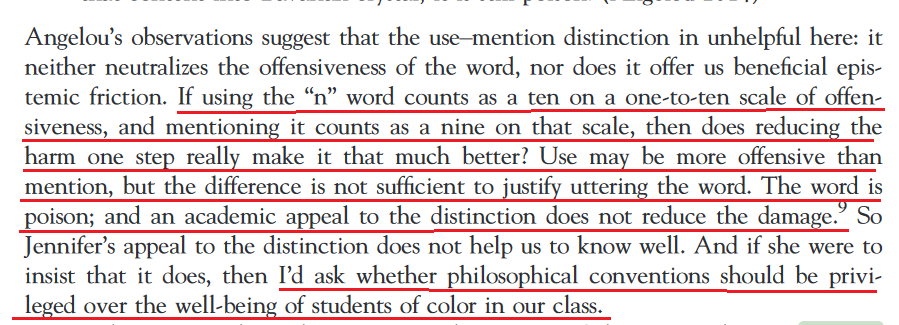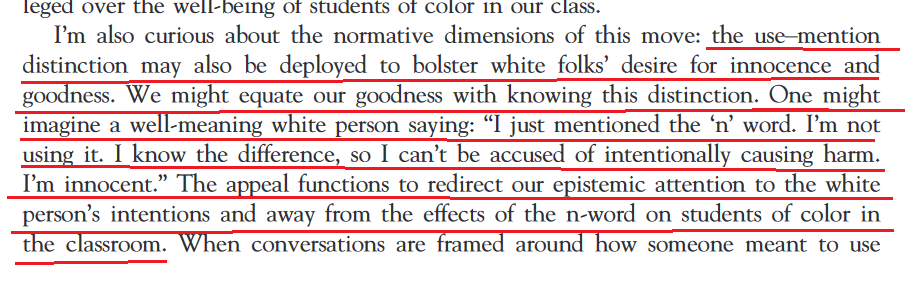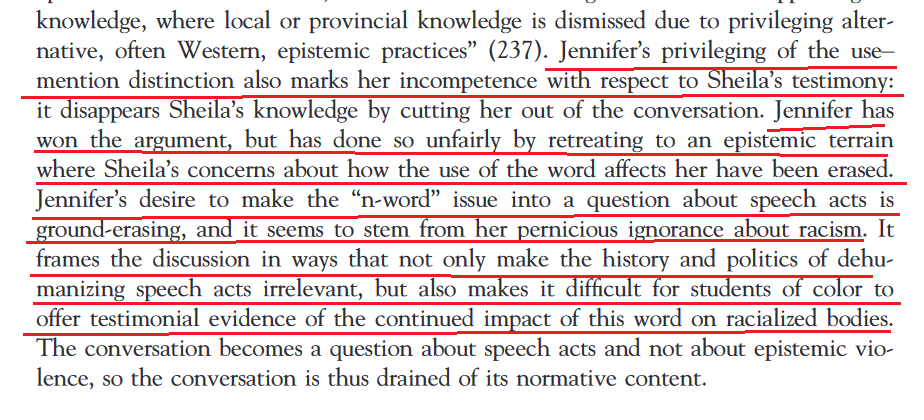1/
IMPACT NOT INTENT!
The idea is that it doesn't matter what you meant to say, all that matters is if someones feelings were hurt.
This idea from woke academic literature is destroying our ability to communicate; to fight it we must understand it.
Impact not intent
A Thread
IMPACT NOT INTENT!
The idea is that it doesn't matter what you meant to say, all that matters is if someones feelings were hurt.
This idea from woke academic literature is destroying our ability to communicate; to fight it we must understand it.
Impact not intent
A Thread

2/
The conceptual machinery that created "impact not intent" has 2 parts
1. The collapse of the use/mention distinction
2. The "Death of the Author" thesis that says the person who says/writes something doesn't get to say how it should be interpreted
I'll explain them in turn
The conceptual machinery that created "impact not intent" has 2 parts
1. The collapse of the use/mention distinction
2. The "Death of the Author" thesis that says the person who says/writes something doesn't get to say how it should be interpreted
I'll explain them in turn
3/
I'll explain the use/mention distinction, give an example, then show how "woke" academics attacked it.
The use/mention distinction is simple. Lets use "cheese" as an example.
You can *USE* the word: "where's the CHEESE?"
You can *MENTION* the word: "How is 'CHEESE' spelled"
I'll explain the use/mention distinction, give an example, then show how "woke" academics attacked it.
The use/mention distinction is simple. Lets use "cheese" as an example.
You can *USE* the word: "where's the CHEESE?"
You can *MENTION* the word: "How is 'CHEESE' spelled"
4/
It's a simple idea:
When you want to refer to the dairy product called cheese you *USE* the word 'cheese'.
When you want to talk about the word 'cheese' itself, the word we use when referring to mozerella, cheddar, feta etc, then you will *MENTION* the word 'cheese'.
It's a simple idea:
When you want to refer to the dairy product called cheese you *USE* the word 'cheese'.
When you want to talk about the word 'cheese' itself, the word we use when referring to mozerella, cheddar, feta etc, then you will *MENTION* the word 'cheese'.
5/
We can *use* words: "boy this cheese tastes very good"
We can *mention* words: "do you know what the definition of the word 'cheese' is?"
When we *use* a word we make use of the *content* of the word.
When we *mention* a word we refer to, or talk about, the word itself.
We can *use* words: "boy this cheese tastes very good"
We can *mention* words: "do you know what the definition of the word 'cheese' is?"
When we *use* a word we make use of the *content* of the word.
When we *mention* a word we refer to, or talk about, the word itself.
6/
Let's look at an example.
Donald McNeil was fired from the New York Times for saying a racial slur.
Now, here is the CONTEXT:
According to Mr. McNeil, he was asked if a girl should be punished for a video she made as a 12-year-old where she said a racial slur...
Let's look at an example.
Donald McNeil was fired from the New York Times for saying a racial slur.
Now, here is the CONTEXT:
According to Mr. McNeil, he was asked if a girl should be punished for a video she made as a 12-year-old where she said a racial slur...
7/
Then, according to McNeil:
"To understand what was in the video, I asked if she had called someone else the slur or whether she was rapping or quoting a book title. In asking the question, I used the slur itself."
Lets assume, for this thread, this is what happened...
Then, according to McNeil:
"To understand what was in the video, I asked if she had called someone else the slur or whether she was rapping or quoting a book title. In asking the question, I used the slur itself."
Lets assume, for this thread, this is what happened...
8/
If that's what happened, this is a case where Mr. McNeil *MENTIONED* a racial slur so he could talk about the word itself. He was not *using* a racial slur, he did not call anyone a racial slur, he *MENTIONED* the racial slur in asking for context about a video.
If that's what happened, this is a case where Mr. McNeil *MENTIONED* a racial slur so he could talk about the word itself. He was not *using* a racial slur, he did not call anyone a racial slur, he *MENTIONED* the racial slur in asking for context about a video.
9/
So, what happened?
Executive editor Dean Baquet said Mr. McNeil's intentions were not malicious and that he would not be fired.
However, McNeil later resigned amid internal pressure,and it is the internal pressure which makes this example so perfect...
So, what happened?
Executive editor Dean Baquet said Mr. McNeil's intentions were not malicious and that he would not be fired.
However, McNeil later resigned amid internal pressure,and it is the internal pressure which makes this example so perfect...
10/
150 NYT staff signed a letter that said it didn't matter if the NYT found McNeil didn't act in a hateful manner, "what matters is how an act makes the victim feel."
They think it doesn't matter if he used a slur or mentioned a slur, the use/mention distinction is irrelevant.
150 NYT staff signed a letter that said it didn't matter if the NYT found McNeil didn't act in a hateful manner, "what matters is how an act makes the victim feel."
They think it doesn't matter if he used a slur or mentioned a slur, the use/mention distinction is irrelevant.
11/
There is an academic a paper by Allison Bailey that uses and example almost exactly like this. Her example is a white student discussing the n-word in class when she does, a black student is hurt. The white student the says the *mentioned* the word, she did not use it.
There is an academic a paper by Allison Bailey that uses and example almost exactly like this. Her example is a white student discussing the n-word in class when she does, a black student is hurt. The white student the says the *mentioned* the word, she did not use it.
12/
Bailey argues the use/mention distinction doesn't matter. Even if a *use* of a slur is worse then a *mention* of a slur, if mentioning the word is hurtful use/mention doesn't matter and we should consider setting aside philosophical distinctions if students of color are hurt.
Bailey argues the use/mention distinction doesn't matter. Even if a *use* of a slur is worse then a *mention* of a slur, if mentioning the word is hurtful use/mention doesn't matter and we should consider setting aside philosophical distinctions if students of color are hurt.
13/
She then argues the use/mention distinction is a red-herring that distracts from the thing that really matters: the hurt that the person who was offended feels.
Please read this screen grab carefully:
She then argues the use/mention distinction is a red-herring that distracts from the thing that really matters: the hurt that the person who was offended feels.
Please read this screen grab carefully:
14/
She finishes up by arguing that appealing to the use/mention distinction is a form of pernicious ignorance about racism, it is to win the debate by appealing to a distinction in linguistics, rather then by focusing on the feelings of the person who was offended:
She finishes up by arguing that appealing to the use/mention distinction is a form of pernicious ignorance about racism, it is to win the debate by appealing to a distinction in linguistics, rather then by focusing on the feelings of the person who was offended:
15/
And just like the staff at the NYT that sent the angry letter about McNeil, Bailey thinks the thing that is of paramount importance is the feelings of the student of color, not how the statement should actually be interpreted.
This is a massive mistake.
And just like the staff at the NYT that sent the angry letter about McNeil, Bailey thinks the thing that is of paramount importance is the feelings of the student of color, not how the statement should actually be interpreted.
This is a massive mistake.
16/
That doesn't mean feelings don't matter at all. I'm Jewish, and I'm hurt when people use Jewish slurs against me (as happens from time to time on this sight) but when someone *MENTIONS* a Jewish slur in the context of discussing it I'm not hurt because I know what they *MEAN*
That doesn't mean feelings don't matter at all. I'm Jewish, and I'm hurt when people use Jewish slurs against me (as happens from time to time on this sight) but when someone *MENTIONS* a Jewish slur in the context of discussing it I'm not hurt because I know what they *MEAN*
17/
use/mention is not an arbitrary convention, it's an insight into how the ways we say things change the meaning of what we say
Bailey attacks that distinction and claims it's irrelevant, what really matters it is the experience of the person who is hurt.
use/mention is not an arbitrary convention, it's an insight into how the ways we say things change the meaning of what we say
Bailey attacks that distinction and claims it's irrelevant, what really matters it is the experience of the person who is hurt.
18/
Let us move to the second part of the coneptual machinary behind "impact not intent": "The Death of the Author" thesis.
First Written in 1967, "Death of the Author," is an essay by Roland Barthes arguing the meaning of a work is not dependent on the intentions of the author
Let us move to the second part of the coneptual machinary behind "impact not intent": "The Death of the Author" thesis.
First Written in 1967, "Death of the Author," is an essay by Roland Barthes arguing the meaning of a work is not dependent on the intentions of the author
19/
The argument is that what the Author writes is interpeted by readers so the meaning of the text is not created in the *writing* of the text, but in the *reading* of the text. This means that whoever does the interpreting of a text ecides what a text means *to them*
The argument is that what the Author writes is interpeted by readers so the meaning of the text is not created in the *writing* of the text, but in the *reading* of the text. This means that whoever does the interpreting of a text ecides what a text means *to them*
20/
The idea that texts have no inherent meaning and people create meaning as they interpret the text for themselves is a postmodern idea which "re-centers" the meaning of a text away from the author and centering the reader by saying it is the reader that creates the meaning.
The idea that texts have no inherent meaning and people create meaning as they interpret the text for themselves is a postmodern idea which "re-centers" the meaning of a text away from the author and centering the reader by saying it is the reader that creates the meaning.
21/
When that idea is extended from text to speech, then just like an Author doesn't decide what his book means, a speaker doesn't decide what the meaning of his speech is.
This means what a speaker meant doesn't matter, what matters is how someone else interpreted what they said
When that idea is extended from text to speech, then just like an Author doesn't decide what his book means, a speaker doesn't decide what the meaning of his speech is.
This means what a speaker meant doesn't matter, what matters is how someone else interpreted what they said
22/
This completes the "impact not intent" machinery.
Once intent no longer matters anyone is free to interpret anything someone said as they wish. They place the power of a word in the word itself, wholly apart from whose using it and how. It's an absurd theory of language.
This completes the "impact not intent" machinery.
Once intent no longer matters anyone is free to interpret anything someone said as they wish. They place the power of a word in the word itself, wholly apart from whose using it and how. It's an absurd theory of language.
23/ Here someone uses the term 'r-slur' to avoid the term 'retard.'
We need the use/mention distintion because sometimes our words are slurs, including many r-words like the r-slur which is one of our slurs. We need use/mention to say that out loud without confusing people.
We need the use/mention distintion because sometimes our words are slurs, including many r-words like the r-slur which is one of our slurs. We need use/mention to say that out loud without confusing people.
24/
While I am sensitive to people who want us to take stock of the rhetorical power of slurs, we cannot put ourselves in situations where we can't report on what people say because we can't use the words they actually used.
Thst would place us in an impossible situation
While I am sensitive to people who want us to take stock of the rhetorical power of slurs, we cannot put ourselves in situations where we can't report on what people say because we can't use the words they actually used.
Thst would place us in an impossible situation
25/
Words are created by us, defined by us, and they only have the power that we give them.
If we give words power over us either words become gods, or we become witch doctors who treat words like spells that give us access to power greater than what we ourselves posses.
Words are created by us, defined by us, and they only have the power that we give them.
If we give words power over us either words become gods, or we become witch doctors who treat words like spells that give us access to power greater than what we ourselves posses.
26/
This is not acceptable.
While I don't want to see what Jacques Ellul called "the humiliation of the word" I do think the laws on language were made for man, man was not made for the laws of language. We ought to think better of ourselves then make our own invisible chains
This is not acceptable.
While I don't want to see what Jacques Ellul called "the humiliation of the word" I do think the laws on language were made for man, man was not made for the laws of language. We ought to think better of ourselves then make our own invisible chains
27/
When we refuse to allow authentic distinctions lile use/mention to contain the power of words, and when we don't allow people to decide what they mean when they speak, the impossible doctrine of impact not intent follows like night follows day. We become responsible...
When we refuse to allow authentic distinctions lile use/mention to contain the power of words, and when we don't allow people to decide what they mean when they speak, the impossible doctrine of impact not intent follows like night follows day. We become responsible...

 Read on Twitter
Read on Twitter